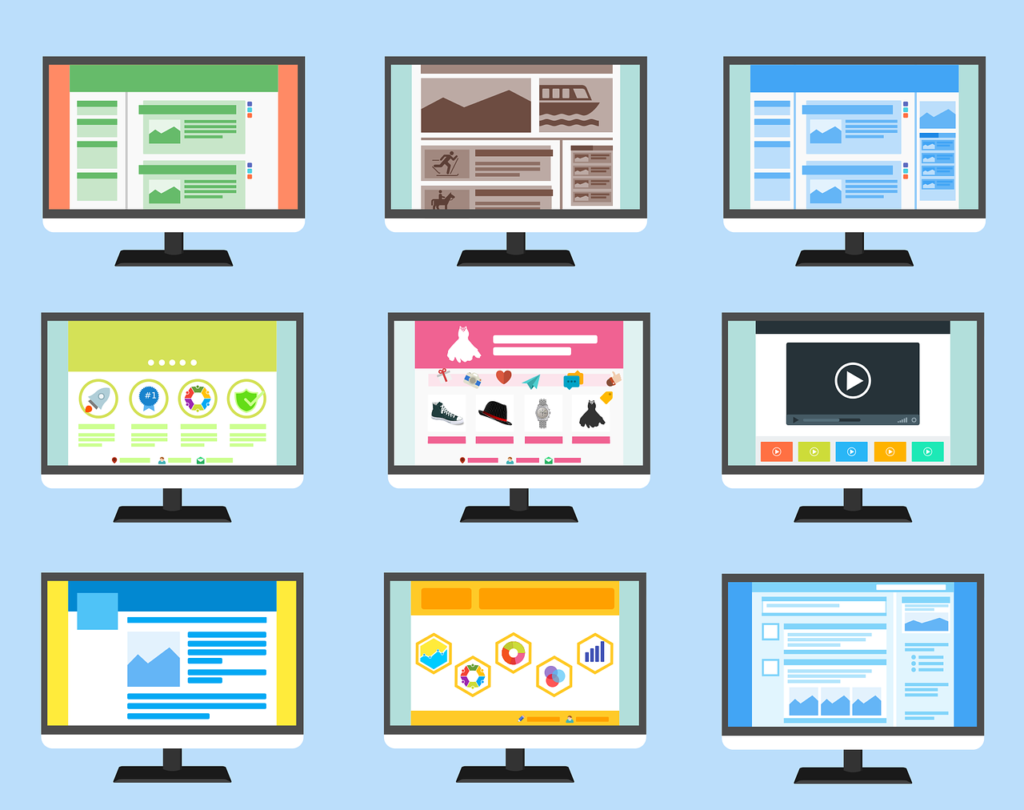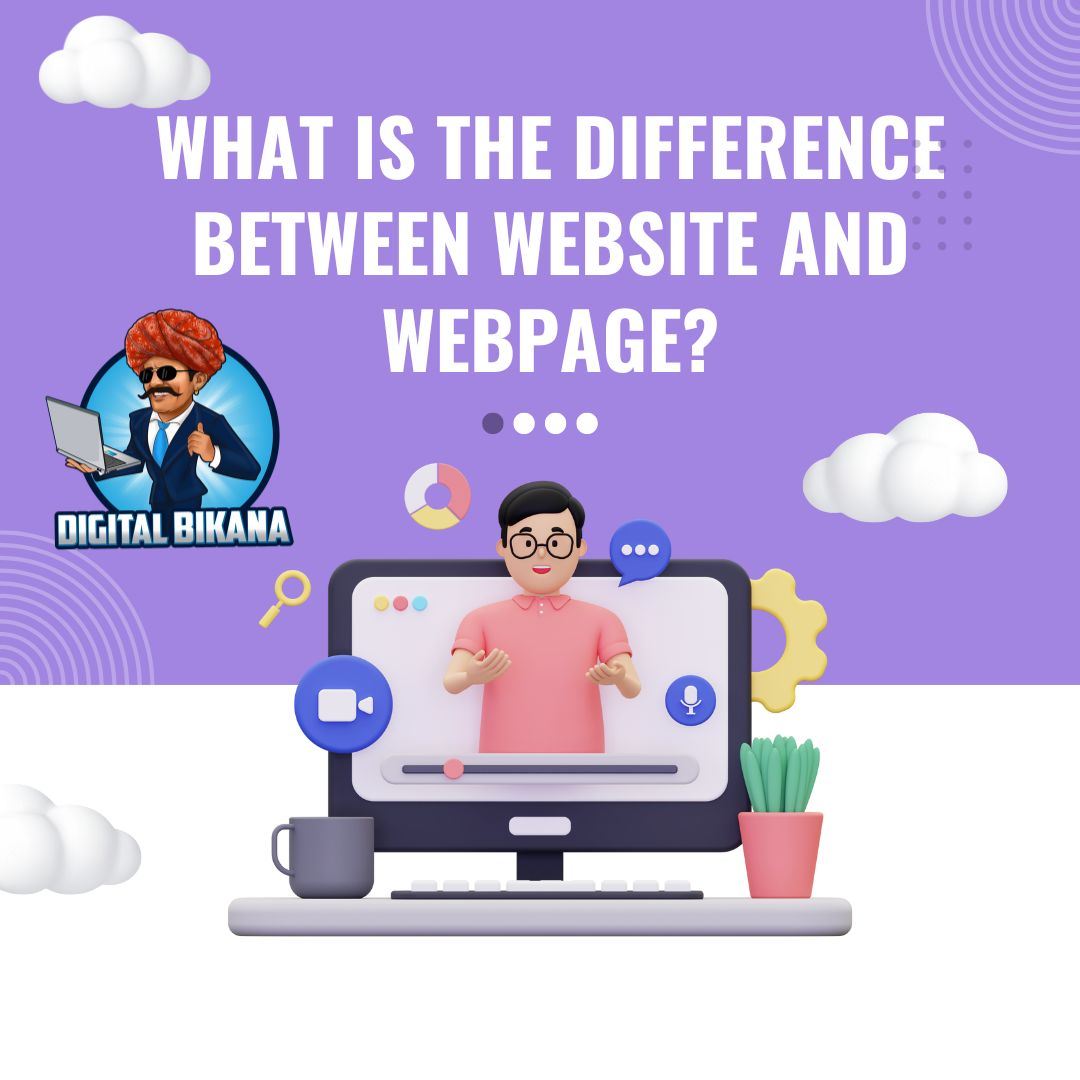What is the difference between Website and Webpage?
In this article we are going to understand what is the difference between Website and Webpage with example? In the digital age, it is imperative to have a strong online presence. Whether you are a small business owner or an individual, having a website or a webpage can be essential for promoting your brand, showcasing your products, or sharing your ideas with the world. However, before you start creating your online platform, it is important to understand the difference between a website and a webpage.
At a basic level, a website is a collection of web pages that are interlinked and share a common domain name. In other words, a website is a group of related web pages that can be accessed through a single URL (Uniform Resource Locator). A webpage, on the other hand, is a single document or file that is displayed in a web browser. In simple terms, a webpage is a single element of a website.
To understand the difference between a website and a webpage better, it is important to look at each of these terms in more detail.
What is a Website?
A website is a collection of web pages that are interconnected and share a common domain name. Websites can range from simple, single-page sites to complex, multi-page sites with hundreds or even thousands of pages. The Websites are typically used to promote a business, organization, or individual and can contain a variety of content, such as text, images, videos, and animations.
Websites can be created for a variety of purposes, such as e-commerce, blogging, news, social networking, entertainment, and more. They are hosted on a server and can be accessed through a web browser like Google Chrome, Mozilla Firefox, or Safari.
Click Here: What is Search Engine Optimization (SEO) in Digital Marketing?
What is a Webpage?
A webpage, on the other hand, is a single document or file that is displayed in a web browser. A webpage can contain a variety of content, such as text, images, videos, and links, and is typically designed to provide information to the user or allow the user to take a specific action.
Webpages can be created using a variety of programming languages, such as HTML (Hypertext Markup Language), CSS (Cascading Style Sheets), and JavaScript. They can be accessed through a web browser by entering the URL of the page in the address bar or by clicking on a link that points to the page.

What is the difference between Website and Webpage?
The Main Differences between Website and Webpage are listed below:
1. Structure and content
- A website is a collection of related web pages that are organized in a hierarchical structure. The homepage is usually the starting point of a website, and from there, the user can navigate to other pages on the site. A website can contain a variety of content, such as text, images, videos, and animations.
- On the other hand, a webpage is a single document or file that is displayed in a web browser. It is usually designed to provide specific information or allow the user to take a specific action.
2. Purpose
- Websites are typically created for a specific purpose, such as promoting a business, organization, or individual, providing e-commerce services, or sharing news and information. Websites can have a variety of goals, such as increasing brand awareness, generating leads, and driving sales.
- Webpages, on the other hand, are designed to provide information to the user or allow the user to take a specific action, such as filling out a form, making a purchase, or signing up for a newsletter.
3. URL
- A website has a unique domain name that is used to access all of the web pages within the site. For example, the domain name for Google is www.google.com, and all of the pages within the site can be accessed by appending a specific path to the domain name.
- A webpage, on the other hand, has a unique URL that is used to access that specific page. The URL of a webpage can be found in the address bar of the web browser.

4. Navigation
- Websites typically have a navigation menu or bar that allows users to easily move from one page to another within the site. This menu or bar is usually located at the top or side of the website and may be present on every page within the site.
- Webpages, on the other hand, do not necessarily have a navigation menu or bar. They may have links within the content that allow the user to move to related pages, but there is no consistent navigation structure across webpages.
5. Size
- Websites can range in size from small, single-page sites to large, complex sites with hundreds or even thousands of pages. The size of a website depends on the purpose and scope of the site.
- Webpages, on the other hand, are typically smaller than websites since they are designed to provide specific information or allow the user to take a specific action.
You can also checkout this digital marketing institute to learn digital marketing course by enrolling in our course Or Contact us on +91-8949483728
6. Interactivity
- Websites can be interactive and allow users to interact with the content in various ways. For example, users may be able to fill out forms, leave comments, or share content on social media.
- Webpages, on the other hand, may not be interactive and may simply provide information without any user interaction.
What is the difference between Website and Webpage with example in Hindi?
To understand the difference between Website and Webpage with example in Hindi kindly checkout the video below:
Conclusion
While the differences between a website and a webpage are significant, it is important to note that the two are interdependent. A website is made up of webpages, and without webpages, there can be no website. Therefore, it is essential to understand how the two work together to create a cohesive online presence.
Websites are typically designed to be user-friendly, visually appealing, and easy to navigate. They are designed to provide a positive user experience and keep users engaged for as long as possible. A good website should be responsive and compatible with various devices, including desktops, laptops, tablets, and smartphones.
Webpages, on the other hand, are designed to be specific and focused. They should provide the user with the information they are looking for quickly and efficiently. This means that webpages should be well-organized, visually appealing, and easy to read. They should also be optimized for search engines, so that they can be easily found by users who are searching for specific information.
One of the key factors in creating a successful website is ensuring that the webpages are interconnected and organized in a logical manner. This means that users should be able to easily navigate from one page to another without getting lost or confused. The navigation menu or bar should be clearly visible and easy to use, and it should provide users with a clear understanding of the structure of the website.
You can also checkout this digital marketing institute to learn digital marketing course by enrolling in our course Or Contact us on +91-8949483728
Another important factor in creating a successful website is ensuring that the content on each webpage is high-quality and relevant. The content should be well-written, engaging, and informative, and it should be optimized for search engines. This means that the content should include relevant keywords and phrases that users are likely to search for when looking for information on a particular topic.
In addition to these factors, websites and webpages should also be optimized for speed and performance. This means that the site should load quickly and smoothly, without any delays or errors. Users are likely to leave a website if it takes too long to load, so it is essential to ensure that the site is optimized for speed.
Another factor to consider when creating a website is security. Websites can be vulnerable to various forms of cyber-attacks, such as hacking, malware, and phishing. It is therefore essential to ensure that the website is secure and protected from these threats. This can be done through various means, such as using strong passwords, regularly updating software and plugins, and using SSL certificates to encrypt data. In conclusion, the main difference between a website and a webpage is that a website is a collection of related web pages that are interlinked and share a common domain name, while a webpage is a single document or file that is displayed in a web browser.
Read Also: How to create a Facebook Page?
Websites are typically larger and more complex than webpages and are designed to achieve specific goals, such as promoting a business or organization. Webpages, on the other hand, are typically smaller and provide specific information or allow the user to take a specific action. Understanding the difference between these two terms is essential for anyone looking to establish an online presence and create a digital platform.While the differences between a website and a webpage are significant, it is essential to understand how the two work together to create a cohesive online presence.
Websites are made up of webpages, and without webpages, there can be no website. Therefore, it is important to ensure that both the website and the webpages are well-designed, user-friendly, and optimized for search engines. This will help to ensure that the site is engaging, informative, and easy to navigate, and that it provides users with a positive experience.

